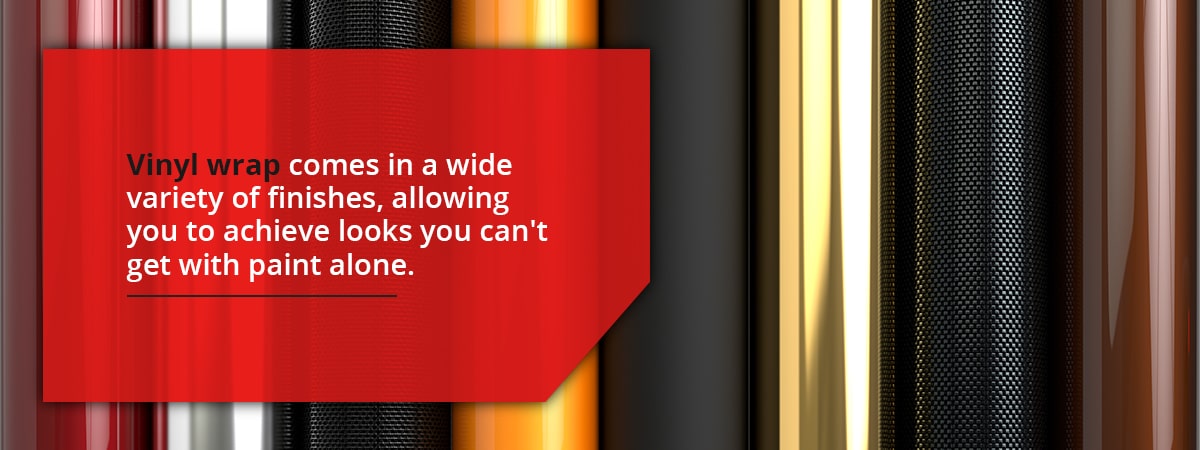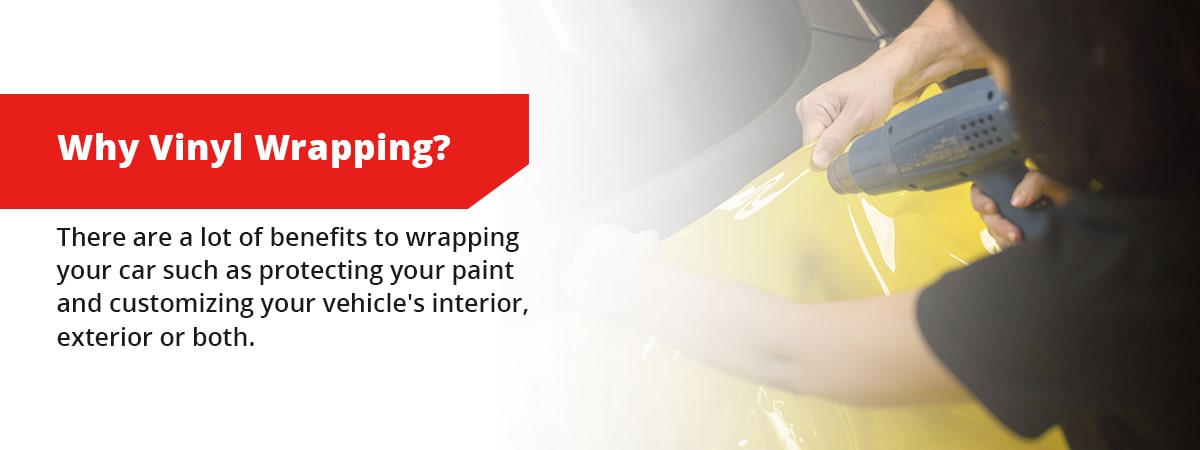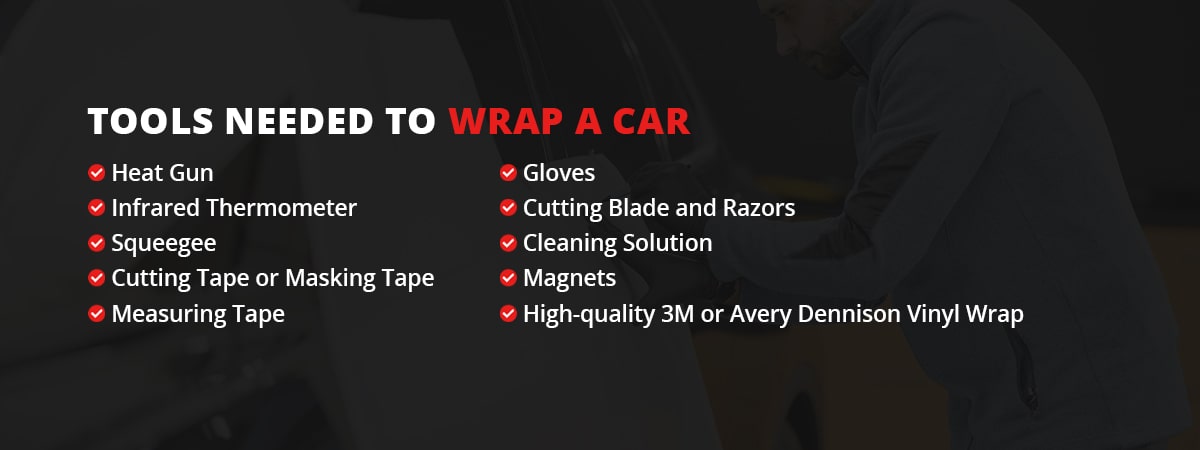
What Do You Need to Wrap a Car?
Are you planning to vinyl wrap your car? Wrapping your car in vinyl is a big project, so knowing where to start is crucial. Planning your project is the first step, and there are several things you need to consider, such as the type and color of vinyl you'd like to wrap your car with, the workspace you're planning to use and the tools and equipment you need to get the job done right. Choosing the right tools for pre-wrapping, post-wrapping and cleaning is essential when customizing your car with vinyl wraps.
If you're not sure what you need to wrap a car, then here are the basic tools and supplies to consider before getting started.

What is Vinyl Wrapping?
Vinyl wrapping is covering the panels of your car using high-quality sheets of vinyl wrap that make it look like it has been painted, but without the expense or commitment. You can use vinyl wrap to customize and protect your car's interior and exterior. Vinyl wrap comes in a wide variety of finishes, allowing you to achieve looks you can't get with paint alone. You can wrap one or two panels, such as your hood or trunk panels, or you can wrap your entire car. The choices you have for customizing your ride using vinyl wrap are almost endless.
However, wrapping a car is not as simple as peel, stick and walk away. Covering your car's panels using vinyl wrap is a big undertaking, and the process requires skill and the right tools. Covering your car in vinyl wrap is a great option for those who want to change a car's color without investing time and money into complex paint jobs. You can cover all or part of your car in custom vinyl wraps such as those made by OROCAL TM 3MTM Wrap Film and AveryDennisonTM Films.

Why Vinyl Wrapping?
There are a lot of benefits to wrapping your car such as protecting your paint and customizing your vehicle's interior, exterior or both. Vinyl wrapping your car gives you the ability to customize your car's exterior without investing precious time and money in costly paint jobs. Where paint jobs require time-consuming stripping, sanding, priming and painting that often takes several days and hours of work, vinyl wrapping your car only takes one or two days and can be done by yourself.
Wrapping your car protects and customizes your ride's paint job for much less money. Vinyl wrap is also safe for any type of paint as the glue used to adhere the wrap is gentle on your car. This makes vinyl wrapping a car an easy choice for anyone looking to customize your car's color and finish without spending a fortune doing so.
Protect and Customize
Vinyl wrapping your car gives you the ability to fully customize your ride with a range of options. The sleek, clean look of vinyl wrap also keeps your car's paint job like new and many times, people cannot tell the difference between a high-end paint job and vinyl wrap. High-quality ORACAL, 3M and Avery Dennison vinyl wraps will keep your car's original paint from chipping, scratching and fading over time. Also, you can easily change your car's wrap when you feel like it's time for a switch.
Cost-Efficient Option for Customization
Vinyl wrapping your car costs a fraction of the price of painting your car, and it saves a lot of time too. That's not to say vinyl wrapping your car is easy. Wrapping your car requires skill, patience, a steady hand and the right tools. If not done properly, vinyl wrapping your car can turn into a costly mess. The good news is that today's vinyl wraps are very user-friendly, so even a beginner will see good results with the proper tools and attention to the process.

Tools Needed to Wrap a Car
Before wrapping your car, consider the necessary wrap tools and equipment you'll need to get the job done. Having the right vinyl wrap tools to get the results you want the first time saves you a lot of stress and headaches. You'll need proper marking and measuring items, car cleaning and preparation equipment plus tools for installing the wrap itself.
You'll need the following tools to wrap a car:
- Heat Gun
- Infrared Thermometer
- Squeegee
- Cutting Tape or Masking Tape
- Measuring Tape
- Gloves
- Cutting Blade and Razors
- Cleaning Solution
- Magnets
- High-quality Vinyl Wrap
Let's take a closer look at each of the items you'll need to wrap a car as well as what they're used for in the vinyl wrapping process.
Heat Gun
A heat gun is an essential tool to wrap your car. The heat gun is used to heat the vinyl wrap after stretching it across the panels of your car. Using a heat gun after stretching the wrap will iron out the wrinkles and prevent the vinyl from bunching, but it also brings the wrap to the specified temperature. You essentially need to heat the wrap to ensure it binds with the surface you're wrapping. This is especially important around the edges between panels where the wrap is stretched over. The recommended temperature is usually somewhere between 140 and 180 degrees Fahrenheit or around 90 degrees Celcius.
Infrared Thermometer
Just as you used the heat gun to warm the vinyl wrap and smooth out wrinkles, you'll need an infrared thermometer to measure the temperature of the surface you just wrapped. You need to ensure you're heating the surface of the panels to the specified temperature. You'll need an infrared thermometer for this.
Squeegee
After laying the vinyl wrap on the panels of the car and applying heat using your heat gun, you'll need a felt edge squeegee to iron out the wrinkles. Consider using a plastic squeegee with a felt edge for an easy and smooth application of the vinyl to your car. These are softer and work better for gripping the car's contours while not tearing the wrap you're laying down. You need a squeegee that will hug the curved and straight edges of the car's body.
Cutting Tape or Masking Tape
Using cutting tape or masking tape around the mirrors and windows helps you cut away the vinyl wrap without scratching your car's paint. Use knifeless tape to seamlessly bridge your vinyl wrap from one panel to the next. If you're installing vinyl film graphics to only sections of your car such as both driver and passenger side door panels, then the cutting or masking tape is great for aligning your graphics so they're straight and evenly laid across the area.
Measuring Tape
Wrapping your car requires precise measurements and planning. Understanding how many rolls of wraps you'll need to cover your car is an important step in the planning process. Use a soft, flexible magnetic measuring tape to calculate the area (length x width) of the car's panels. This will ensure you order enough vinyl wrap to cover your car. A good rule of thumb is to order more than you'll need to cover your car in case you need to rewrap. You'll naturally need a little extra wrap so you can tuck the wrap around the edges of your car, but using flexible magnetic measuring tape allows you to account for curves and contours in your car's body. Using a quality measuring tape will help you cut down on cost and order the correct amount of vinyl wrap needed for your project.
Gloves
Using the right gloves to install wrap on your car is very important to the overall finished product. A good clean wrap requires soft wrap gloves made of cotton for smoothing out wrinkles and ensuring clean edges. Wrap gloves also protect against electrostatic sticking when smoothing out your wrap. Gloves also prevent rough hands from ripping into and gripping the vinyl when you're smoothing it out over the contours of your car's panels. This keeps you from unintentionally bunching the vinyl wrap you're laying down.
Cutting Blades and Razors
Choosing the right cutting blade for vinyl wrapping your car is essential. Be sure to choose a properly angled blade that offers you the ability to cut your wrap in the right shapes to match your car's contours. You'll need an Avery Dennison Metal Breakaway Knife designed for cutting high-quality vinyl wraps. You'll want to choose a knife with a 30-degree blade and a metal frame to prevent any flexing. The metal frame prevents flexibility when handling your cuts while also ensuring straighter, more accurate cuts. A snitty is an enclosed blade cutting tool designed specifically for cutting vinyl materials. It prevents any extra fuzz or shavings from your paper from adhering to the vinyl sheets when making your cuts by hiding the blade and allowing for clean cuts.
Cleaning Solution
You'll need a cleaning solution for cleaning your car's surface areas before and after laying down vinyl wrap. Since vinyl wrap adheres to your car's surface, cleaning that surface to ensure it's free of any dirt, grease and lubricants is an essential step to wrapping your car. You also need to strip off any wax and oil from your car before laying your vinyl wrap. Using a wrap pre-cleaner such as Rapid Tac Rapid Prep cleaning solution will eliminate all of the wax, oil or silicone lubricants, such as cleaners used on tires or wheels, and allow your vinyl wrap to stick to your car without any wrinkling or bunching due to non-adhering of the wrap.
Just as necessary as pre-cleaning your car to lay down your wrap, is using a wrap post-cleaner. Your wrap is sure to get dirty as you drive your car, so cleaning your vinyl car wrap is essential. You'll need to choose the right cleaner and sealant that matches your vinyl wrap. Cleaning and maintaining your wrap will ensure a great-looking and long-lasting wrap job.
Magnets
If you're going at installing your car's wrap solo, then you'll definitely need a couple of pairs of high-quality wrap magnets. Wrap magnets are a must-have vinyl wrap tool that will serve as an important extra pair of hands needed to get your vinyl wrap job done and done right the first time. You'll use magnets, preferably ones with easy-to-grip handles, to help hold your vinyl wrap in place as you lay down sections and cover panels. Position magnets to help hold your cut sections of vinyl wrap in place over your car's panels and remove them as you work your way out to the edges. Magnets also help you align your vinyl wrap and ensure you're lined up properly across all sections of your car.
High-quality 3M or Avery Dennison Vinyl Wrap
Choosing the right wrap is essential to giving your car the look you want. There is a range of different looks to choose from including shade-shifting, brushed or carbon fibers, smooth satin and flaked metallic just to name a few. You'll need to order enough wrap to cover your car plus extra to account for the edges you'll need to overwrap and any rewrapping you may need to do if you make a mistake. Choosing from 3M and Avery Dennison vinyl wraps comes down to the look you're trying to achieve. With over 80 different finishes to choose from, 3M's 1080 Series Wraps offers you a wide range of wraps to customize your car. Likewise, Avery Dennison 900 Series Films also give you a lot of color and finish options to make your car stand out and match your style.
Get What You Need to Wrap Your Car at Rvinyl.com
Choosing the right type of vinyl wrap to comes down to a matter of preference. One thing is certain — you'll want to choose the best equipment and tools for wrapping your car. Planning and preparing to vinyl wrap your car requires careful research that is often time-consuming and misleading. You'll need a trusted source you can go to for all of your vinyl wrap needs.
At Rvinyl, we offer a wide range of vinyl wraps to meet your customization needs. Our large selection of tools and equipment has you covered with everything you need to wrap and maintain your car's vinyl wrap job.
Need help figuring out how to vinyl wrap your car? Check out Rvinyl's vinyl wrap resources complete with a multitude of helpful tips and how-to-guides designed to assist you in your car-wrapping projects.
Have questions about wrapping your car or need help with your shipment or order? Contact us now!
